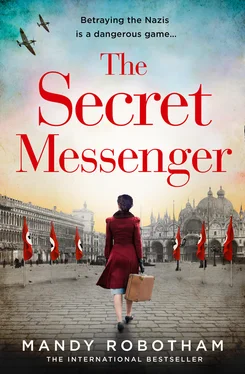Mercifully, an object that is not a fat bound book of memories pushes its way out of the gloom. Instead, it’s a grey, moulded case whose shape – square and sloping towards a brown leather handle – means it can only be one thing. It has the look of a life well worn, the scuffs and scratches immediately reminding her of the history Daisy sports on her own casing. There is a distinctive twang as both clasps spring upwards under Luisa’s fingers, and what almost sounds like the escape of a human breath as she lifts the lid. Even under the dim light, she can see it is beautiful – a monochrome mix of black and grey, white keys ringed with a dull metal and glowing bright against the dimness. Luisa puts a tentative finger on one of the keys, pressing it gently, and the mechanism reacts under her touch, sending a thin metal shaft leaping towards the roller. It hasn’t seized up. She notes, too, that there is a ribbon still attached and, even better, a spare, sealed reel tucked alongside the keyboard. The aged cellophane is intact but almost disintegrates under her finger. If fate is on her side, however, the ribbon won’t have dried up.
Luisa fixes the lid back down and pulls the case away from a pile of boxes – it’s surprisingly light for an old machine. As she pulls, the lid on one of the boxes slides off, sending a puff of dust in its wake. She turns to replace it, but her eye catches a single photograph, black and white yet sepia-toned with age. It features a man and a woman – their joyful expressions suggest a couple – standing in St Mark’s Square in Venice, the distinctive grandiose basilica behind them, surrounded by a groundswell of pigeons. She recognises her mother in the features of the woman, but not the man. Luisa searches her memory – did her mother and father even mention going to Venice, perhaps for their honeymoon? It looks that kind of photo – the couple seem happy. It’s not how she remembers her parents, but she thinks even they must have been in love once. And yet the photo looks older than that, from a bygone age.
Luisa is aware of her Italian roots, the spelling of her name being an obvious indication. Both of her mother’s parents were Italian, but they died some years ago; her grandfather when she was just a baby, and grandmother in her early teens. She knows very little about their history – her mother would never talk about it – except that they were both writers. She likes to think she has inherited at least that family trait from them.
She flips over the photograph; scrawled in pencil are the words ‘S and C, San Marco June 1950’. Her mother was Sofia, but she was born in 1953, so maybe it’s her grandmother’s face beaming contentment? S for Stella? Perhaps that’s Luisa’s grandpa standing alongside her – Luisa barely remembers him, only a fleeting image of a kindly face. But his name was Giovanni. So who is C? It’s entirely possible he was a suitor before Grandpa Gio, as she knows they called him. Luisa’s curiosity gives way to a smile, her first in days, and the movement of the muscles feels odd. She thinks they look so stylish, he in his high-waisted suit trousers, and she in a neat Chanel-like suit and elegant court shoes, her hair swept in a chic, black wave.
Luisa bends to replace the photograph in the box, but sees that underneath a decaying layer of tissue paper there is more – photographs and paper scraps, some hand-scribed and others typed in an old font, perhaps on the newly discovered machine? To any other curio browser it would warrant a look at the very least, but to a journalist it spikes the senses. There is something about the smell too – the pungency of old dust – which sticks in Luisa’s nostrils and makes her heart beat faster. It reeks of lives lived and history unmasked.
The whole box is heavy and awkward to manoeuvre down the attic stairs and into the living room. In the daylight however, she sees the real treasure come to light. Under a layer of loose type and several browned, brittle newspapers bearing the name Venezia Liberare , Luisa can sense it: a mystery. It’s in the fine sandy texture under her fingers as she gingerly lifts the paper cache – men and women grinning in fuzzy tones of black and white, some she notes casually using rifles as props, or proudly holding them across their chests, women included. Momentarily, she is shocked; in a distant memory, her grandma never appeared as anything other than that – a sweet old lady who dished out cuddles and chocolates, grinning mischievously when she was inevitably rebuked by Luisa’s mother for spoiling her with sweets. Sometimes, Luisa remembers her slipping little wrapped bars when no one was looking, whispering ‘Shh, it’s just our secret’, and she felt like they were part of a little gang.
The typewriter is momentarily forgotten as Luisa picks up each piece, peering at its faded detail, squinting to fill in the gaps of pencil scratchings lost to the years. It hits her squarely then – how many people’s histories are contained in this cardboard box with its sunken edges and corners gnawed at by the resident mice? What might she discover in its depths amid the deceased spiders and smell of mould? What will she learn about her family? She wonders, too, if there is an element of fate in her discovery, if today of all days she was meant to find it – to piece it all together in some order, and in turn glue her recently shattered self back together. For the first time in weeks, she feels not defeated or leaden with grief, but lifted a little. Excited.
2 Contents Cover Title Page THE SECRET MESSENGER Mandy Robotham Copyright Dedication Author’s note Prologue: Clowns Chapter 1: Grief Chapter 2: The Lion’s Den Chapter 3: Bedding In Chapter 4: Discovery Chapter 5: A New Task Chapter 6: Two Sides of the Coin Chapter 7: New Interest Chapter 8: Finding and Frustration Chapter 9: Drinks with the Enemy Chapter 10: A New Role Chapter 11: Casting Out Chapter 12: Opening Up Chapter 13: Story Time Chapter 14: A Voice from the Lagoon Chapter 15: Love and Fury Chapter 16: A Lull Chapter 17: On Hold Chapter 18: Small Talk Chapter 19: A Detour Chapter 20: Arrival Chapter 21: The City Cauldron Chapter 22: The Seeker Chapter 23: A Fiery Reaction Chapter 24: Across the Lagoon Chapter 25: A New Hope Chapter 26: Revenge Chapter 27: The Bloody Summer Chapter 28: Seeking and Waiting Chapter 29: Sorrow Chapter 30: A Low Ebb of the Tide Chapter 31: Playing Detective Chapter 32: A Parting Chapter 33: In Hiding Chapter 34: The Search for Coffee Chapter 35: Red-Handed Chapter 36: Taking Flight Chapter 37: Age and Enlightenment Chapter 38: After Chapter 39: Completion Chapter 40: The Typewriter Acknowledgements Keep Reading … About the Author By the Same Author About the Publisher
The Lion’s Den Contents Cover Title Page THE SECRET MESSENGER Mandy Robotham Copyright Dedication Author’s note Prologue: Clowns Chapter 1: Grief Chapter 2: The Lion’s Den Chapter 3: Bedding In Chapter 4: Discovery Chapter 5: A New Task Chapter 6: Two Sides of the Coin Chapter 7: New Interest Chapter 8: Finding and Frustration Chapter 9: Drinks with the Enemy Chapter 10: A New Role Chapter 11: Casting Out Chapter 12: Opening Up Chapter 13: Story Time Chapter 14: A Voice from the Lagoon Chapter 15: Love and Fury Chapter 16: A Lull Chapter 17: On Hold Chapter 18: Small Talk Chapter 19: A Detour Chapter 20: Arrival Chapter 21: The City Cauldron Chapter 22: The Seeker Chapter 23: A Fiery Reaction Chapter 24: Across the Lagoon Chapter 25: A New Hope Chapter 26: Revenge Chapter 27: The Bloody Summer Chapter 28: Seeking and Waiting Chapter 29: Sorrow Chapter 30: A Low Ebb of the Tide Chapter 31: Playing Detective Chapter 32: A Parting Chapter 33: In Hiding Chapter 34: The Search for Coffee Chapter 35: Red-Handed Chapter 36: Taking Flight Chapter 37: Age and Enlightenment Chapter 38: After Chapter 39: Completion Chapter 40: The Typewriter Acknowledgements Keep Reading … About the Author By the Same Author About the Publisher
Читать дальше












